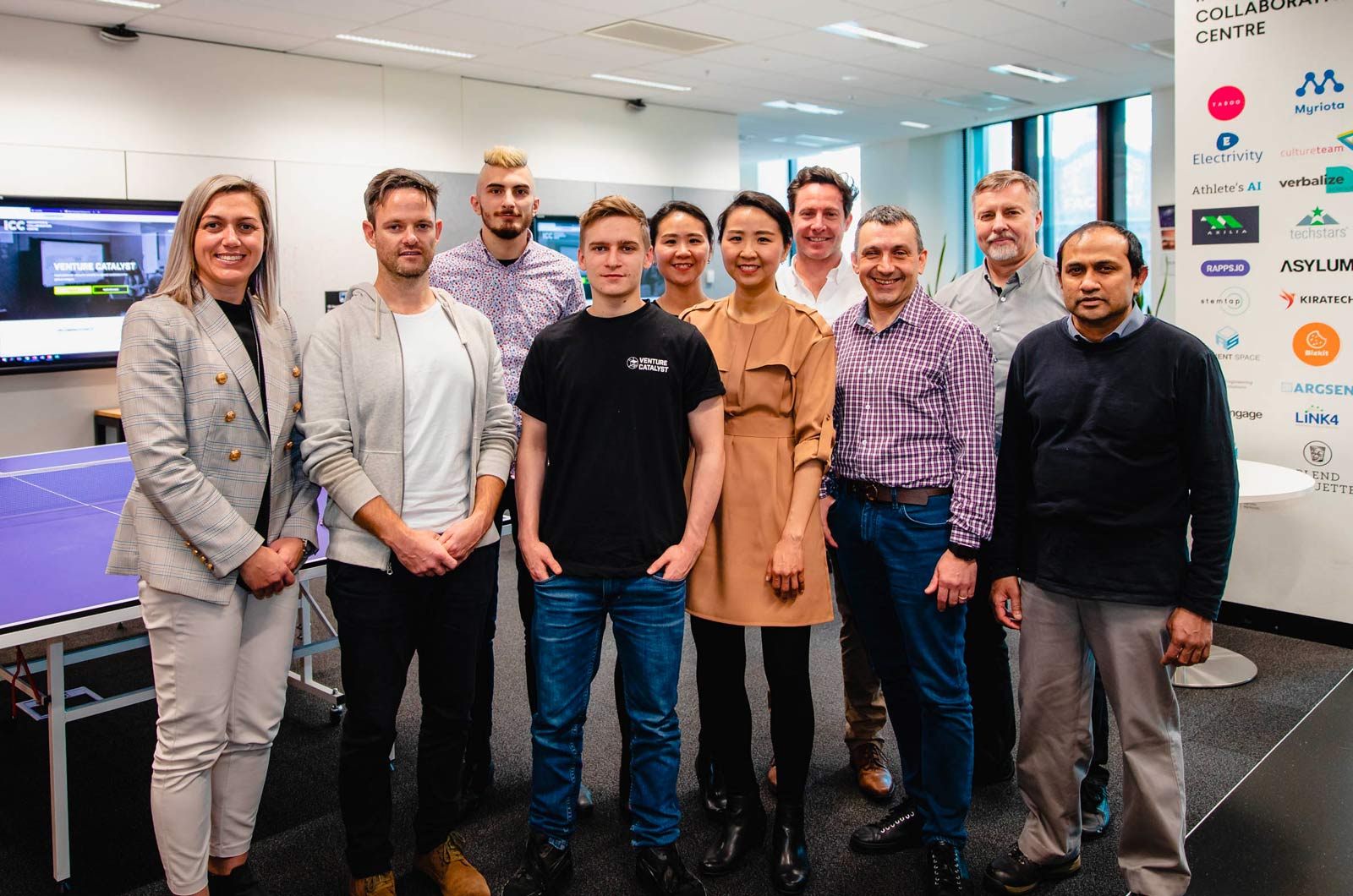
Representatives from new companies selected to take part in Venture Catalyst 2020 (left to right) Katie Gloede (Sport Tech Learn), Venture Catalyst participant, Albert Marashi and Jack Gallagher-Bohn (Live Map), Chia-Chi Chen and Sylvia Chien (Ominiwell), Marshall Cowan (Licorice) and Serguei Rossomakhine, Henry Sukhinin and Prabhu Manyem (ByteProTeQ). Missing: Ben Longstaff (Golden).
The Innovation & Collaboration Centre at UniSA today announced the local startups who will take part in the Venture Catalyst incubator program in 2020 after a record number of applications.
The successful participants will receive a personalised support program uniquely designed to assist early-stage founders to navigate their journey towards building a globally scalable and investment-ready business.
The Venture Catalyst experience includes world-class startup workshops, coaching and personal mentoring, a stipend, access to a global network of expert advisers, as well as the University’s student, academic and industry connections.
The program harnesses the strengths of the University and incorporates elements that are Powered by LeapSheep to set a new benchmark in startup support.
For the first time, the program was divided into three categories: General, supported by UniSA, for any industry sector focusing on new business concepts with the potential for high growth; Space, supported by the South Australian Space Industry Centre for new services or products in the space industry; and Social Enterprise, supported by the Pank Family for UniSA students and staff social enterprises.
The program is supported by the University and the South Australian Government through the Department of Innovation and Skills.
Minister for Innovation and Skills David Pisoni says Venture Catalyst is especially important in the current global environment, because it is helping to create and support new technologies with the potential to form new industries.
“We are supporting as many entrepreneurs as we can through this challenging time and encouraging them to come back with new ideas and innovations for the future,” Minister Pisoni says.
“By providing them with the tools for success through the Venture Catalyst program, we are giving more people a chance to create real economic growth which will ultimately drive growth in our state economy.
“I am looking forward to seeing the impact these new, innovative companies have on our entrepreneurial ecosystem.”
The companies selected to take part are ByteProTeQ, Golden, Licorice, Live Map, Ominiwell, Vimbal and, Sport Tech Learn in the Social Enterprise category.
- ByteProTeQ
- ByteProTeQ is developing a real-time optimisation tool for airport air traffic control to support emergency response decisions, based on the world class optimisation model and modern parallel computer processing.
- Golden
- Golden is a financial wellness app providing insights into personal finance to help customers make informed decisions in their best interests. Unlike its competitors, Golden does this without needing bank login details or violating banks terms of service.
- Licorice
- Licorice is updating the user interface for all existing IT software, removing the need for the common ‘ticket’ system ensuring employees and customers know the progress of every job and when it will happen.
- Live Map
- The Live Map application is used to create and visualise maps from digital data and imagery. The software is a map editor which supports multiple users editing maps in real-time and is used to visualise map data and build maps for public and private use.
- Ominiwell
- Ominiwell is creating a unique method for testing drug interaction on patients using 3D cell culture that will help to eliminate dependency on animal testing and help to personalise medicines for patients suffering from cancer and other diseases that rely heavily on new drugs and treatments.
- Sport Tech Learn (Social Enterprise category)
- Sport Tech Learn (STL) specialises in designing new integrated, hands-on curriculum and resources that engage students in STEM and literacy, using sport as the vehicle. All STL programs have suggested links to the Australian Curriculum Assessment and Reporting Authority standards, creating adaptable and reliable resources for teachers, schools and parents.
Along with the successful applicants, a number of other companies that applied have been offered mentoring, workshops and office space.
Associate Director of the ICC, Jasmine Vreugdenburg says it is important to continue supporting early stage disruptive technologies, especially when there are economic downturns.
“We believe more new companies start in downtimes than in good times and come out the other end, stronger and more resilient for the experience,” she says.
“While it’s important to support existing businesses, we want to support fast-growth startups as well, because they can be crucial to our economic recovery.”
Media contact: Georgia Minarelli email Georgia.Minarelli@unisa.edu.au mobile: 0413 314 726



